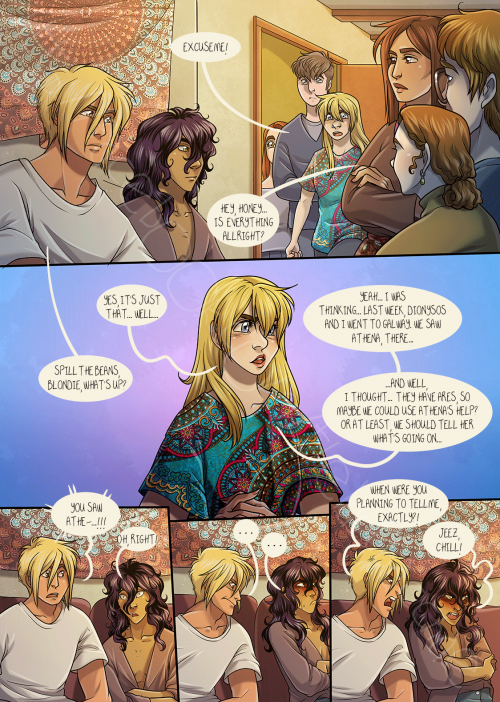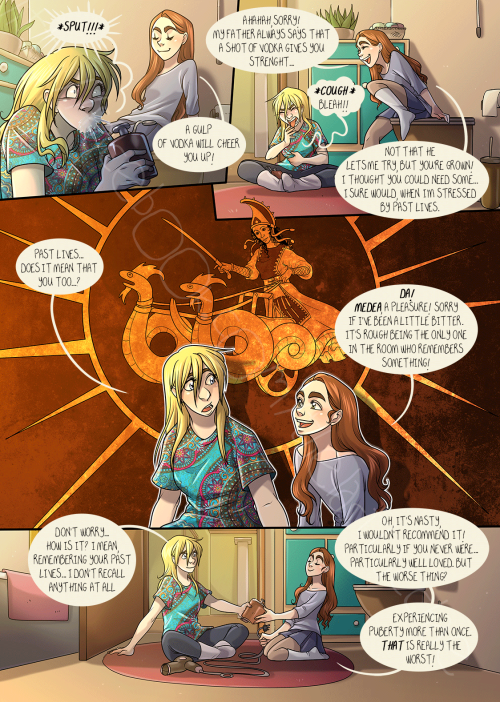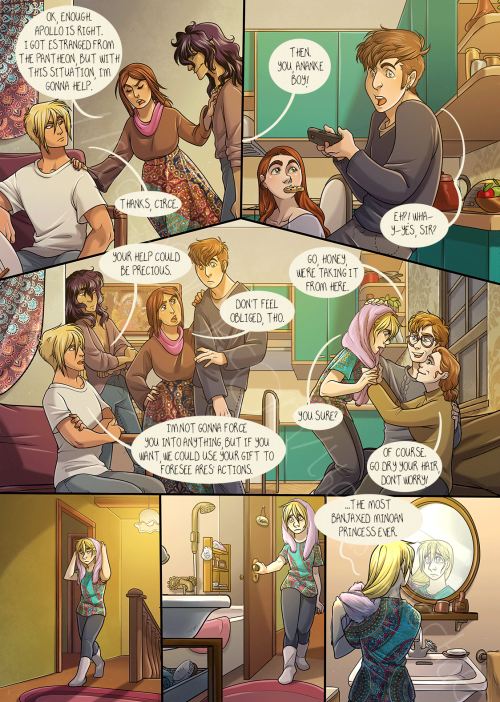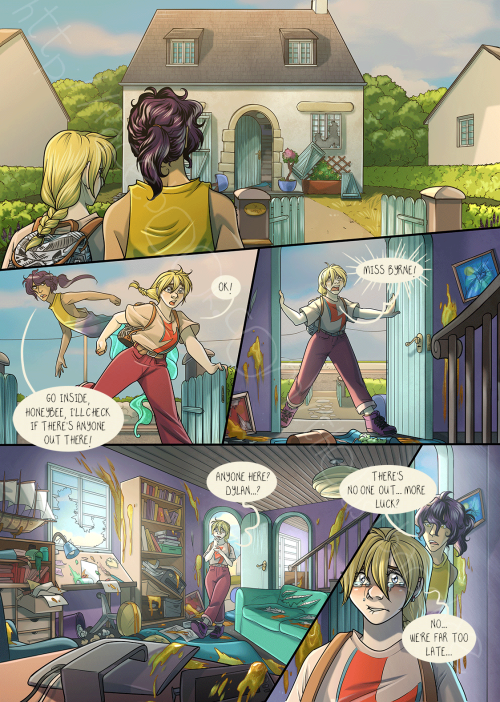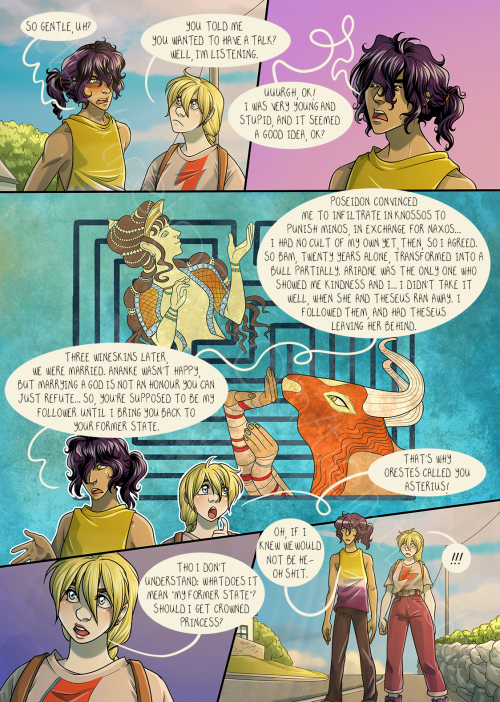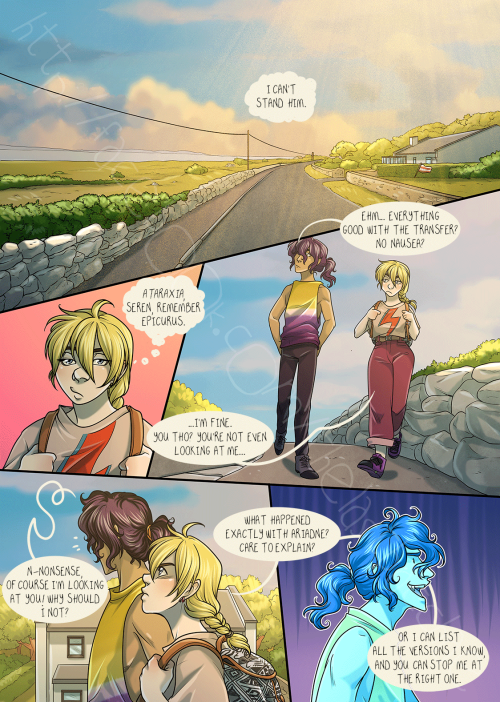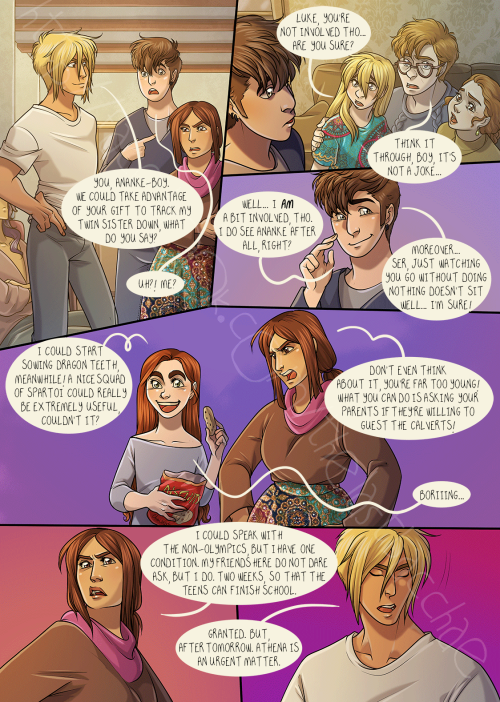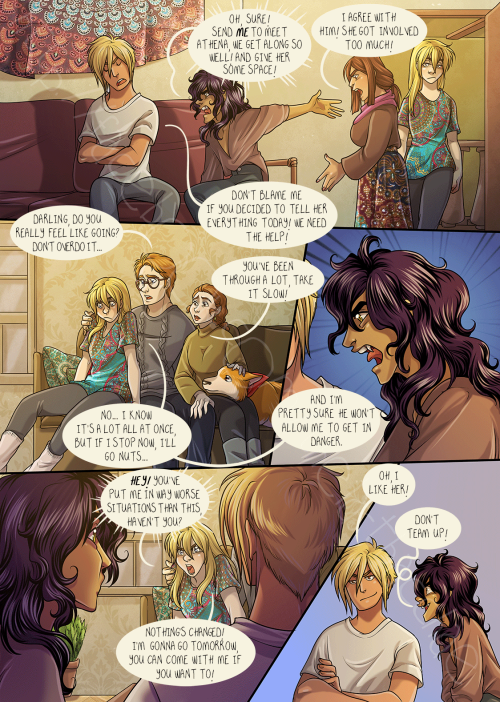#tlb update
Ch. 5, Page 36.
<< Previous||StartReading||Next >>
He didn’t say anything because of the stars. Couldn’t do it. Not today.
It’s absolutely not that the memory of the event went right to Xibalba.
(cit.)
Post link
Ch. 5, Page 35.
<< Previous ||StartReading||Next >>
“I’m sorry, prof, I couldn’t do my homework because I had to save the world. Furthermore, a war god who was passing by destroyed all my notes and books, so it really would have been impossible, you see…”
Post link
Ch. 5, Page 33.
<< Previous||StartReading||Next >>
We know this looks a little like a tutorial, but please don’t do this at home. Dragon teeth are best used only as decorative pieces.
Note: Sowing dragon teeth.
It’s told (Pseudo-Apollodorus, Bibliotheca; Apollonius Rhodius, Argonauticae) that if you take some dragon teeth and sow them in a well ploughed field, they’ll grow up into some fierce warriors, fully armed, called Spartoi (which in ancient Greek means “the sown ones”).
The first to experiment this hardcore garening techniques was Cadmus, instructed by Athena: it was her who suggested the hero to toss a coin to your witch-ehr, no. To toss a rock amidst the newly grown warriors. That act indeed distracted them: they accused each other of the offending act, and killed each other sparing Cadmus. The five that survived the skirmish helped Cadmus building Thebes up.
The second one was, later, Jason, challenged by King Aeetes in Colchis. Poor Aeetes was most likely hoping to spare himself some nuisance and get rid of the nth hero come there with an attitude to be killed in the pursue of the golden fleece. Sadly, Medea was already looking at this particular hero with heart-shaped eyes, and she told Jason what to do exactly, included the trick of the rock to avoid getting chopped up by the Spartoi.
Moral of the story: You may be tired of seeing monsterae deliciosae all over Instagram, but they aren’t THAT dangerous.
Post link
Ch. 5, Page 32.
<< Previous||StartReading||Next >>
It was told that she has some anger management issues…
(We also would like to state that she is strictly forbidden to access the liquour cabinet. “I don’t care how many lifes you lived and how many relatives you dismembered, little miss, you’re now 12 and you’re now grounded.” cit.)
Notes:
The background image is inspired by a Lucan krater from around 400 b.C., now at the Cleveland Museum of Art. The dressMedea is wearing, tho, is the reconstruction of a traditional garment worn in the Colchis/Caucasian area in ancient times, in the Archaeological Museum of the Republic of Alania, in Vladikavkaz.
Medea was the princess of Colchis -the coastal area of the modern Georgia-, daughter of king Aeetes who was the son of Helios, and thus brother of Circe and of the Minoan Queen Pasifae.
She helped Jason (read as: she did all the work and Jason took credit) in conquering the golden fleece her family had in the garden, guarded by a dragon. She also agreed to help the Argonauts flee from Colchis, on the promise Jason would have married her. Because true love can do everything, included forgive the fact that the blushing bride dismembered her own brother to distract her father and escape.
But nobody’s perfect, and once back to Greece and Jason crowned king, the pair lived happily ever after… Or at least, for few years. Then, Jason remembered he was a douchebag: he decided to take another wife, younger, Greeker and without a bodycount of her own, informing Medea of the happy news in a flawless way. With an eviction note for her and their two sons.
Medea chose to be elegant about it: she killed the two kids, murdered the second wife while she was at it, and left Corinth on her chariot trained by dragons, in an unmistakable “Fuck you, sir”.
After that, tho, she tried to redeem herself: she fled to Athens, married again with king Aegeus and she really put some effort to free Greece from Theseus. She tried to poison him, but was discovered and exiled all over again. She took a definitive residence in what is now Turkey, in the region that from her took the name Media, and Theseus was now free to go rampant and become the scarcely encomiable hero we all know.
Post link
Ch. 5, Page 31.
<< Previous||StartReading||Next >>
Yeah, let’s accept mysterious flasks from pre-teens who casually are experts in the use and mantainance of crossbows, what could go wrong?
Note: “Slàinte” (read “slAwn-che”) and “No sdorove” (read “na sdarO-vye”) mean “Cheers” in Irish and Russian.
Post link
Ch. 5, Page 43.
<< Previous||StartReading|| Next >>
Did you really think we already got tired of destroying houses? uwu
(a moment of sileence for whomever will have to clean all that ichor from the walls and the furniture and the pc.)
Post link
Ch. 5, Page 42.
<< Previous||StartReading||Next >>
The classic equivalent of getting married in Las Vegas while drunk.
Note:
The version of the myth of Dionysos and Ariadne we state here is not perfectly adhering to the sources, but it was adapted a little by Arja, who frankensteined some versions and interpretations. The version that claims that Theseus didn’t left Ariadne alone on Naxos willingly, but was instead told to do so by Dionysos himself, can be found in Diodorus Siculus (Greek historian of the I century a.C., Biblioteca Historica, 5. 51. 4). On the other hand, the correspondence between Dionysos and the Minotaur was taken from the analyses of Karolyi Kerenyi on the cult and the dionysian mysteries (in “Dionysos” and “The Gods and Heroes of Greece” in particular). Dionysos was as a matter of fact called by his followers in the mysteries “bull-horned god”… And also as a proper “Star”, just as the Minotaur was (from his name, “Asterius”, which means “Star”), as we can also find in Aristophanes (Frogs, 342) and Sophocles (Antigone, 1146).
Post link
Ch. 5, Page 41.
<< Previous||StartReading||Next >>
Such unjustified bad faith!
Note:
Ataraxia: According to the philosopher Epicurus -no sex drugs and rock'n'roll, that was a Christian misconception-, it is the ideal mental state in which any man can truely attain happiness. It is that place of complete mental calmness, untroubled by worries or any emotional turmoil. (cit. Epicurus, Letter to Menecaeus or Letter on Happiness)
Post link
Ch. 5, Page 40.
<< Previous||StartReading||Next >>
The world won’t be saved by equation, finding the x or logarithms!Or maybe it wi- DEFINITELY IT WON’T!
Post link
Ch. 5, Page 39.
<< Previous||StartReading||Next >>
Why, did you really think she was joking about the dragon teeth? No no, she has a full satchel of them in her desk drawer, just beside her Sailor Moon secret diary.
Post link
Ch. 5, Page 38.
<< Previous||StartReading||Next >>
All that’s left do decide is whether is weirder that Dionysos and Circe actually agree on ONE thing, or that Apollo is smiling.
Post link
Ch. 5, Page 37.
<< Previous||StartReading||Next >>
Apollo’s clearly not paid quite enough to cope with all this DRAMAH, of which he’s absolutely out of, it’s just Theban blood making Dionysos all that extra, the Olympic counterpart has nothing to do with it.
Post link
Oops, looks like someone had her dragons eat today’s page!
<< Previous||StartReading|| Next Chapter >>
Aaaaaaaaaaaand for this chapter too the publication stops here!
Thank you to everyone who stayed with us in this most relaxing and quiet chapter with the unofficial title of “Arja and Marty, Dream Home Demolitions” (cit.), we really enjoyed reading and replying to all your comments! Speaking of which, if you have any theory, question, so on and so forth… COME HITHER LADIES, GENTLEMEN AND WHOMEVER FEELS IN BETWEEN, we can’t wait to hear your opinions, know where do you think we’re going from here!
Spoiler: next chapter will be full of deities.
And what about the end of the chapter? Worry not: unfortunately we have no good news to spare for what concerns online shops… BUT, we did find a solution, and we’re working on that right now. You’ll know everything in the next few weeks, hopefully. We won’t leave you alone. :)
The tightest hug, see you soon with wips, and we recommend everyone to stay away from hubris!
In the meanwhile, if you want to read again or get on track with some things you may have missed, you can check…
<<Chapter 1||Chapter 2||Chapter 3||Chapter 4 ||Chapter 5 >>
Post link
Ch. 5, Page 44.
<< Previous||StartReading||Next >>
f you leave her in a random Ikea, she can find her way out in the least time possible.
(Except she’ll take five minutes for a necessary stop at the shop, for cinnamon rolls and gingerbread biscuits)
Another little clarification: It’s not anything comparable to any super-power, she just has a great sense of directions. Orestes has the bonus “Beloved by Erinyes”, which is definitely better, isn’t it?
Note:
Ichor: It’s what gods have instead of blood (Homer, Iliad, V, vv. 339-342). Traditionally, the colour can vary (we chose gold for an association in various myths between gold and immortal/sacred things, like the apples of the Hesperides, the golden fleece etc. Some say it was blue or transparent, Apollonius Rodius equated it to lead as it was part of the giant Talos) and potentially toxic for humans.
Post link

